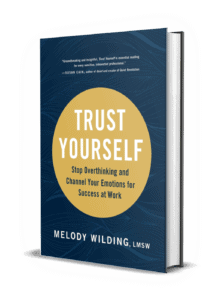Fear vs. intuition, how do you tell the difference? How do you know when your gut is telling you that something isn’t right for you versus when is it imposter syndrome holding you back?
What is Intuition?
Let’s start with definitions. You may know intuition by another name–hunch, gut feeling, deeper knowing. It’s the ability to immediately understand something without conscious reasoning. In other words, answers and solutions come to you, but you may not be aware of why or how.
Your intuition works on implicit memory, which is your ability to remember and recall things without conscious reasoning (like how you know it’s not a good idea to touch a hot stove). Your brain very quickly, in a matter of milliseconds, assesses a situation and considers your mental Rolodex of past experiences, personal needs, preferences, etc., and then it gives you an intuitive hunch for a decision based on that context.
It’s helpful then to think of intuition like an internal traffic light when your intuition wants to slow you down. In this way, intuition is like an internal traffic light, cautioning you to slow down or stop when a situation isn’t good for you or you’re not ready or giving you a green go-ahead to move at full speed when something is right.
Intuition can be hard to describe because it’s abstract and intangible. It’s a feeling – nonverbal and energetic–almost like a sense or a vibe. But I’m willing to bet that there are concrete instances of how you see your intuition at work in your everyday work in life.
Some examples include:
- Reading between the lines and sensing what other people are thinking or feeling before they say it
- A flash of insight or a great idea that seems to come out of nowhere
- Getting a pit in your stomach when you have to make a decision
Scientists call the gut the “second brain” for a reason. There’s a vast neural network of 100 million neurons lining your entire digestive tract. That’s more neurons than are found in the spinal cord, which points to the gut’s incredible abilities.
Intuition tends to be most useful in situations where analytical thinking alone isn’t enough. Research shows that for big life decisions, such as choosing where to live or what type of job to take, people are far happier and more satisfied when they make intuitive choices.
Sensitive Strivers and the Power of Intuition
As a Sensitive Striver, you have stronger intuition than the other 80% of the population. I call intuition your Sensitive Striver sixth sense because you are someone who processes the world around you more deeply. You’re also more aware of other people’s emotions. You have an amazing capacity to pick up on what other people miss and to recognize patterns and synthesize inputs. And because of that, your intuition is more highly developed. You have a deeper bank of knowledge to pull from about the world and about yourself.
The problem is that most Sensitive Strivers have not learned the tools to trust themselves. Many have actively learned to distrust ourselves. We have been conditioned to believe that being sensitive is wrong – something to be hidden and ashamed of. We’re told to grow a thicker skin, to stop taking things so personally. These messages lead us to stop trusting our intuition. Sensitive Strivers also tend to look externally for praise and approval, which takes us further and further away from knowing what is best for us.
If you have ever struggled to tell the difference between intuition and fear, you are not alone. The good news is that intuition is like a muscle. With conscious attention and focus, it is something you can strengthen.
Fear vs. Intuition
So how do you know when you don’t want to do something because you are afraid or nervous versus it actually not being in your best interest? Here’s how to discern between intuition and fear.
Let’s start with what fear looks like. When fear shows up, it tends to feel like pushing energy, as if you want to avoid disappointment, ridicule, or disapproval. Your motivation is to avoid punishment or being ostracized. In your body, fear tends to feel like high-speed, frenetic, unsettled, energy. It’s not uncommon to experience tenseness – as if your muscles are gripping – or minimizing or constricting. You may feel like you’re actually physically getting smaller (e.x. your posture is hunched).
With fear, your mental dialogue tends to be dominated by harsh, critical thoughts. Your inner critic speaks very loudly and is dominating and dramatic. It encourages you to hide, hold back, conform or otherwise compromise yourself and minimize your needs. Fear thrives in busyness.
Intuition, on the other hand, tends to feel like pulling energy – it feels like you’re being drawn toward your best interests, even if it requires you to take a risk. There’s hope and maybe even underlying excitement. In your body, intuition tends to feel like a calm, inner knowing. It’s relaxed and characterized by trust– knowing that if something doesn’t work out, it’s not the end of the world. it’s much more growth-oriented in your body. It feels like a sense of expansion and openness.
While fear’s voice is critical, intuition’s is encouraging and a reflection of deeper wisdom. Intuition urges you to shine, move at your own pace, and pursue what you need – even if that’s different from what the majority would choose.
How to Listen to Your Intuition
Here is a simple exercise that you can try today:
- Grab a piece of paper and pen.
- On the paper, write down a question you’re struggling with. For example, “is taking on more responsibility going to make me happy?”
- Write Yes and No on the paper below the question.
- Leave a pen nearby and walk away for a while.
- When you come back to the paper, circle Yes or No. Force yourself to respond within two to three seconds.
You may not be happy with the answer you get, but this is a great way to start encouraging yourself to respond more honestly and intuitively.
Check out the Ultimate Guide for Sensitive Strivers for free resources to outsmart imposter syndrome, stop second-guessing yourself, and much more.









